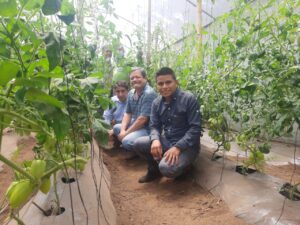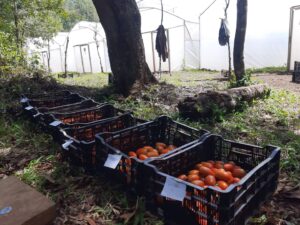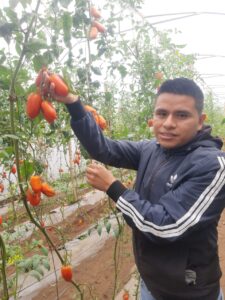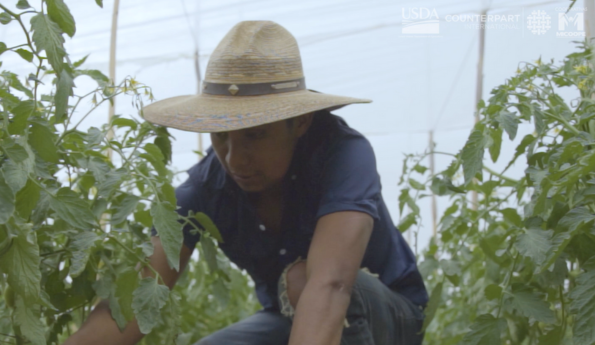To increase agricultural productivity and support farmers in western Guatemala, the Food for Progress project PROCAMPO awarded a cash grant to the Nueva Vision Cooperative in February 2022. The grant aimed to improve tomato production, a lucrative crop in the region. With the resources provided by the grant, the cooperative installed seven chapel-type greenhouses, which are used by 18 families in the municipality of San Juan Cotzal in the department of Quiché.
Among the cooperative members, 29-year-old Samuel López Sambrano stands out. Sambrano has recently been registered by the Ministry of Agriculture, Livestock, and Food as a supplier for the school feeding program in primary schools in his municipality, which allows Samuel to connect his production to a reliable market and support his community. “When the Ministry of Education gave me the opportunity to offer vegetables to pre-primary and primary schools, I became very interested and now our cooperative has been able to participate thanks to Counterpart, which gave us the resources to establish greenhouses for tomato production. This is truly a unique opportunity that the associates of the New Vision Cooperative have had,” he said.

Production and harvesting of tomato in the greenhouses provided by Counterpart International in the Nueva Visión Cooperative
Sambrano recognizes that knowledge alone is sometimes not enough to improve living conditions, and acknowledges that it is necessary to have financial support for the implementation of productive infrastructure which allows them to be a competitive producer. “Before obtaining this grant, my family used to grow tomatoes in open fields, which was susceptible to pests and diseases, and obtained a yield of only 1,000 pounds of tomatoes. We now have a greenhouse, which has allowed us to increase production to 3,500 pounds in the same area of land. With this we obtain an average income of $1,117 in each crop cycle. We had not seen this amount of production or profit before, and for us it is a great joy because even in a space so small you can generate a lot of income. Now we must continue working and expand this greenhouse to grow, because tomatoes are in great demand in schools and in the markets.”
The cash grant has allowed Sambrano and the other participants to increase their technical knowledge in the production of vegetables under the semi-controlled conditions of greenhouses. Sambrano added, “we learned to adopt new technology to improve our production. We also developed experience in commercial matters since this grant allowed us to enter a working relationship with the schools under the School Feeding Law. Now we sell our produce to three educational centers .This guarantees economic income to each of the families in the cooperative.”

The grant recipients have moved away from the traditional practice of growing tomatoes in the open and are now producing tomatoes and vegetables in greenhouses. Greenhouses are beneficial for production as they protect against the elements and extend growing seasons. The cooperative can now use staggered production cycles, and diversify the crops they cultivate to better serve demand of schools. “Our product is of better quality and that makes the difference with our competitors. ”
To support more producers in the community, the New Vision Cooperative carries out field days, replicating the techniques used to produce vegetables. It is expected that other farmers can adopt this technology to improve their own production, and obtain larger volumes of vegetables to market through the cooperative.
Read more about our Food for Progress program here.





